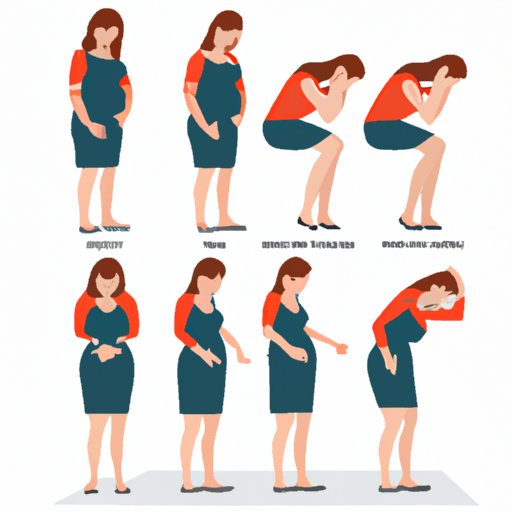
Introduction
For many women, pregnancy symptoms can be the first indication of a new life growing inside them. From morning sickness to tender breasts, these symptoms can vary in intensity and duration, and each woman’s experience is unique. In this article, we will explore when pregnancy symptoms typically start, what they might feel like, and how to cope with them.
7 Early Signs of Pregnancy: When to Expect Those First Symptoms
While pregnancy symptoms can be different for every woman, there are a few early signs that are commonly experienced. These include:
- Missed periods
- Tender breasts
- Fatigue
- Nausea
- Vomiting
- Frequent urination
- Mood swings
While these symptoms can vary in intensity and duration, they are typically among the first signs of pregnancy.
From Fatigue to Morning Sickness: Understanding Pregnancy Symptoms in the First Trimester
The first trimester of pregnancy is when most women experience the most significant symptoms. These symptoms include:
- Fatigue
- Morning sickness
- Headaches
- Constipation
- Emotional changes
These symptoms are caused by various physical and hormonal changes in the body. Increased blood flow and hormonal changes are the primary reasons behind fatigue, while fluctuating hormone levels can lead to morning sickness.
Is it Normal to Feel Exhausted and Nauseous During Early Pregnancy? Experts Weigh In
It’s normal to feel exhausted and nauseous during early pregnancy, say experts. Dr. Lisa Vallejos, a licensed clinical psychologist, explains that hormonal changes during this time can affect a woman’s mood and energy levels, leading to fatigue and other symptoms. And while nausea can be uncomfortable, Dr. Vallejos says it’s usually not harmful to the fetus.
Tracking the Timeline: When Do Most Women Experience Pregnancy Symptoms?
Most women begin to experience pregnancy symptoms between 4-6 weeks after their last period. However, some women may experience symptoms earlier or later, and some may not experience any symptoms at all.
Below is a timeline of when most women experience common pregnancy symptoms:
- Missed period: 4-6 weeks after the last period
- Tender breasts: 4-6 weeks
- Fatigue: 4-6 weeks
- Nausea: 6 weeks
- Vomiting: 6 weeks
- Frequent urination: 6-8 weeks
- Mood swings: 6-10 weeks
- Morning sickness: 6-12 weeks
A First-Hand Account: Surviving the First Few Weeks of Pregnancy Symptoms
An expectant mother who has recently experienced early pregnancy symptoms shares her first-hand account. She reveals that her symptoms ranged from morning sickness to tender breasts and fatigue. She also provides some helpful tips on how she has been coping with these symptoms, such as eating small, frequent meals and staying hydrated.
The Science Behind Early Pregnancy Symptoms: What Actually Happens in Your Body
The science behind early pregnancy symptoms can be complex, but it ultimately comes down to hormonal changes and physical processes happening in the body. Progesterone and estrogen levels spike during early pregnancy, leading to various symptoms such as nausea and breast tenderness.
Other physical changes happening during early pregnancy include the formation of the placenta, which produces hormones that are essential for the body to sustain a pregnancy.
Preparing for the Unknown: A Guide to Dealing with Early Pregnancy Symptoms
Fortunately, there are practical ways to cope with early pregnancy symptoms. Here are some tips:
- Eat small, frequent meals, and stay hydrated to reduce nausea.
- Get as much rest as possible, particularly during the first trimester.
- Consider talking with a healthcare professional about medical treatments that may help alleviate some symptoms.
- Try natural remedies like ginger or acupressure bands.
Conclusion
Early pregnancy symptoms can be an exciting, yet overwhelming experience for many women. While every woman’s experience is unique, fatigue, nausea, and breast tenderness are among the most common symptoms. Remember that these symptoms are a healthy sign of a growing pregnancy and that there are ways to manage them. Be sure to talk to your healthcare provider if you have concerns or questions.




